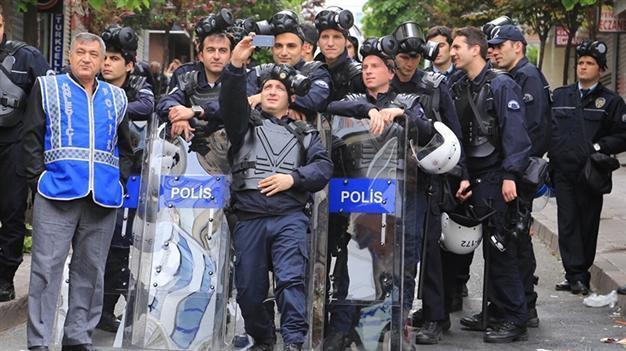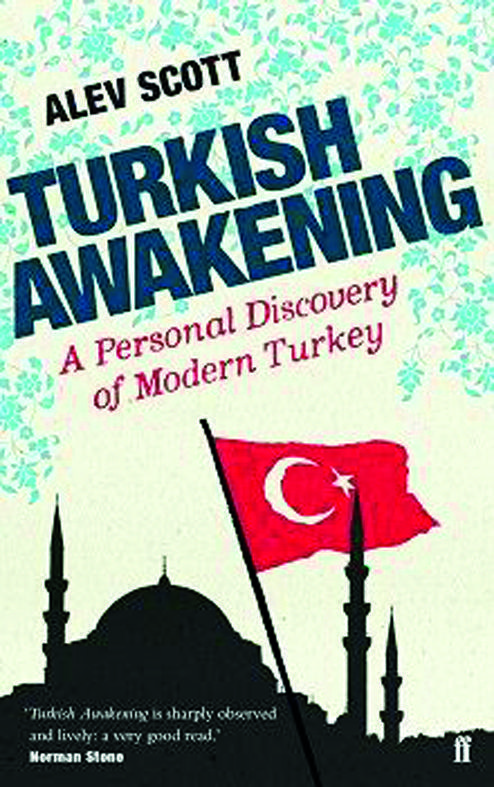Turkish awakening
William ARMSTRONG - william.armstrong@hdn.com.tr
 ‘Turkish Awakening’ by Alev Scott (Faber, 336 pages, £15)
‘Turkish Awakening’ by Alev Scott (Faber, 336 pages, £15)Ten or 15 years ago, a title like this probably wouldn’t have appeared. The idea of Faber publishing a book on Turkey for a general audience only makes sense after a decade during which the country has steadily risen in international visibility, and is now the focus of considerable political, economic and cultural attention. Alev Scott is a British Turk whose heritage drew her back to Istanbul after graduating from university in 2009. Observing both from the sidelines and from within, her broad stated intention in “Turkish Awakening” is “to understand what it means to be Turkish.” Tackling such a knotty country is difficult in 300 pages, but Scott is an engaging guide; the outsider should find something to hold their attention on every page, and even the more wizened Turkey-watcher should find plenty of food for thought.

Scott skips through 12 chapters on all the major social and political issues facing the country, drawing heavily on both her travels and her intuitions. The writing remains cliché-free on some of Turkey’s most clichéd questions: Its perennial secular/religious divide, the position of Turkish women, the troubled education system, the business environment, the arts, the explosion in international popularity of Turkish TV serials, the country’s breakneck urban development and its suffering environment. The latter subject is particularly germane considering last summer’s Gezi Park protests, which first erupted in reaction to plans to concrete over one of central Istanbul’s remaining green spaces for a shopping mall (the city’s 115th). Scott wrote this book before, during and after the protests - a wave of unrest unprecedented in scope in modern Turkish history – and they provide her with a constant reference point as she addresses the country’s many foibles.
She has an unfussy style and a deft turn of phrase. On Turkey’s unhappy EU accession process, for example, the relationship is compared to “an over-keen suitor constantly being rejected by a coquettish mademoiselle as she led him on a neverending game of kiss chase … fundamentally an undiginified situation.” On the popularity in the Arab world of those Turkish TV serials: “It would seem that the semi-liberal yet not-too-alien lifestyles idealized in Turkish “diziler” are perfectly pitched for an Arab audience yearning for a world to which they can both relate and aspire … Turkey is, after all, recognizably Middle Eastern while having many of the attractive trappings and fashions of a European country.” On the popular appeal of the mercurial Recep Tayyip Erdoğan, who worked his way up from the blue-collar Istanbul neighborhood of Kasımpaşa to become president (after spells as a semi-professional footballer, a bus driver and a water bottle delivery man) “it’s almost as if someone has made up his CV specifically to appeal to the large portion of ordinary working Turks.” Scott also recognizes that the authorities’ arrogance in response to the Gezi protests, and the head-spinning conspiracy theories that followed, actually stem from a deep-rooted insecurity. Astutely, if rather patronizingly, she says the country’s current struggles “bring to mind the predicaments of an adolescent who is simultaneously self-confident and insecure.”
The book isn’t flawless. It’s difficult to understand how the editor allowed Scott in the opening chapter to commit journalistic faux pas no. 1: Quoting taxi drivers in a bid to take the pulse. We’re also told that Turkey is a “country of paradoxes” (isn’t every country on earth?), while crossing continents from Europe into Asia over the Bosphorus is “quite literally breathtaking.” However, one of the book’s bigger handicaps is the fact that, like most Westerners, Scott is most comfortable with the secular segments of this very diverse society. As a result, she leaves the new pious middle class, over which much ink has been spilled elsewhere, largely untouched. Though sometimes overemphasized elsewhere, and by no means a majority of the country’s religious conservatives, that constituency is key to unlocking much of what is happening in Turkey today, so it’s a shame that this book doesn’t address it in more detail.
What’s more, with Turkey’s news agenda so chaotically unpredictable, this book could perhaps already use an update. The Gezi protests about which Scott writes so much seem like a distant memory now, with the focus shifting to the regional turmoil that is shaping the country in unprecedented ways. Indeed, there’s always a surprise around the corner in Turkey, and however bad the prognosis looks right now it would be foolish to confidently predict what direction the country will take in the long run. As a lively general guide to the recent – if not current - state of play, this book is a good place to start.
 ‘Turkish Awakening’ by Alev Scott (Faber, 336 pages, £15)
‘Turkish Awakening’ by Alev Scott (Faber, 336 pages, £15) Scott skips through 12 chapters on all the major social and political issues facing the country, drawing heavily on both her travels and her intuitions. The writing remains cliché-free on some of Turkey’s most clichéd questions: Its perennial secular/religious divide, the position of Turkish women, the troubled education system, the business environment, the arts, the explosion in international popularity of Turkish TV serials, the country’s breakneck urban development and its suffering environment. The latter subject is particularly germane considering last summer’s Gezi Park protests, which first erupted in reaction to plans to concrete over one of central Istanbul’s remaining green spaces for a shopping mall (the city’s 115th). Scott wrote this book before, during and after the protests - a wave of unrest unprecedented in scope in modern Turkish history – and they provide her with a constant reference point as she addresses the country’s many foibles.
Scott skips through 12 chapters on all the major social and political issues facing the country, drawing heavily on both her travels and her intuitions. The writing remains cliché-free on some of Turkey’s most clichéd questions: Its perennial secular/religious divide, the position of Turkish women, the troubled education system, the business environment, the arts, the explosion in international popularity of Turkish TV serials, the country’s breakneck urban development and its suffering environment. The latter subject is particularly germane considering last summer’s Gezi Park protests, which first erupted in reaction to plans to concrete over one of central Istanbul’s remaining green spaces for a shopping mall (the city’s 115th). Scott wrote this book before, during and after the protests - a wave of unrest unprecedented in scope in modern Turkish history – and they provide her with a constant reference point as she addresses the country’s many foibles.